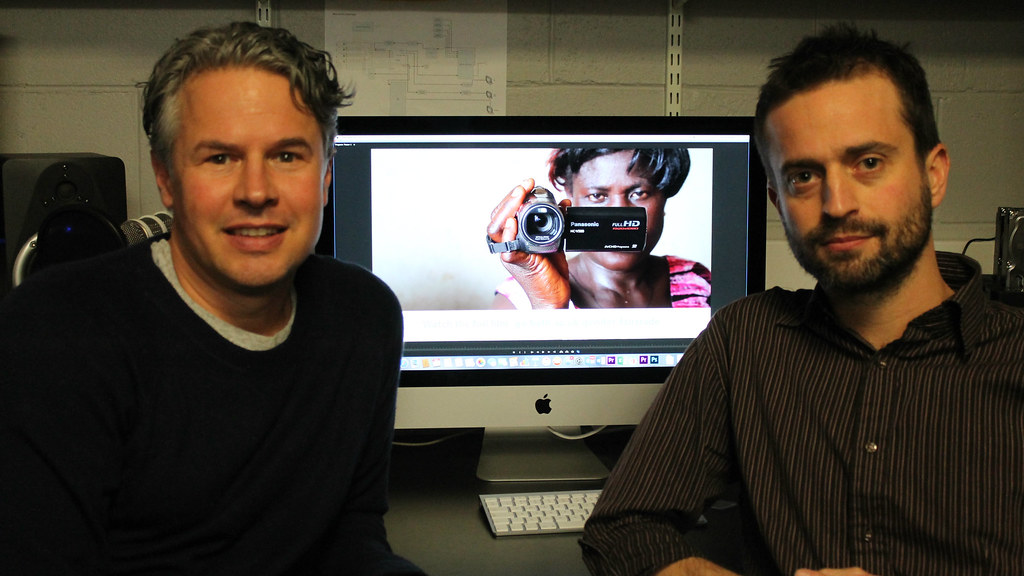A film produced by Dr Roy Maconachie and Simon Wharf from the University’s Department of Social & Policy Sciences and Computing Services Audio Visual Unit has been nominated for a prestigious British Universities Film and Video Council Learning on Screen Award 2017.
Their film, ‘Gender and Fairtrade: the stories of women cocoa farmers in Ghana’, which was also produced with Dr Elizabeth Fortin at the University of Bristol, is one of only four entries to have been nominated for the General In-House Production Award. Winners will be announced at a special ceremony hosted at the British Film Institute on Thursday 27 April.
Based on research carried out in Ghana over the summer of 2015 with support from the British Academy, ‘Gender and Fairtrade’ documents the enormous contributions made by women to the production and supply of cocoa, despite the fact that their role often remains under-valued and, in some cases, unrecognised.
Using film to highlight research
Through participatory video, whereby the women farmers used cameras to chart aspects of their lives, the film shows that despite the significant contributions they make, access to land, capital and markets often remains the preserve of men, substantially limiting women’s ability to reap the financial rewards of their efforts.
It suggests that more needs to be done to raise awareness of the issue and to incentivise through Fairtrade certification.
Dr Roy Maconachie said: “It’s a great honour to be nominated for this award. I have always been a firm believer in the power of visual images to tell stories, and it’s fantastic that film is being taken seriously as a tool for disseminating academic research. Film makes it possible for us to translate our research findings into a medium that is easily accessible to a very wide, non-academic, audience.
"Film is also being increasingly used by development practitioners as a medium to strengthen civil society engagement and to inform policy-making. The film we have made explores gender and Fairtrade through video material captured by me, but also through video shot by the research participants themselves. That, I think, is the most powerful element of the film: the use of participatory video allows the women farmers in the film to tell their stories themselves and in the process offer a much more nuanced picture of the gendered impacts of Fairtrade.
"It has been a great experience working on this project with Simon. He is a very talented film maker and I’m really pleased that he has been so passionate about helping me translate my research into film. We are now working on a new project together which will seek to deepen understanding of the main challenges associated with facilitating improved governance in artisanal and small-scale mining communities in West Africa."
Simon Wharf added: "Roy and I first worked together on a film exploring the artisanal diamond trade in Sierra Leone. He had already returned from Africa with the film in the can and contacted the Audio Visual Unit as he was looking for an editor to put it together. With Roy having a background in photography, I was immediately drawn to the quality and richness of the images, as well as the power behind the subject matter.
"We then had the opportunity to work together again after Roy secured funding from the British Academy to make a film on the cocoa trade in Ghana. This time we designed the film together pre-production, and a particular feature that came to define it was that it would use participatory video. In other words, the women farmers would use cameras to shoot sections of the film themselves, enabling the viewer to get closer to the story. For this we used cameras provided by Computing Services Audio Visual and when Roy returned from Ghana it was clear we had a powerful film on our hands which would appeal to a wide audience beyond the University.”
Head of the Department of Social & Policy Sciences, Dr Joe Devine said: “Through this film Roy and Simon have shined a light on the daily struggles women farmers in Ghana face and some of the ways in which policy-makers could respond to help improve their situation. This medium has been a very effective way to share research findings about a complex issue with a wide public and I’m delighted the film is getting the recognition it deserves.”
Assistant Director of Computing Services, Gordon Roberts said: "Computing Services is committed to providing the highest standards of research and learning and teaching support for the University and it is thrilling to have these standards recognised on the national stage. The exemplary standards that Simon’s collaborative and creative work demonstrates is both typical of our expected standards and I am delighted that he has been nominated. He is a credit to the University, to Computing Services and to the Audio Visual Unit."
Next stop: Sierra Leone
This week the pair are flying out to Sierra Leone to spend a week filming in Kono District, Sierra Leone’s main diamond producing region. The project is being funded by the San Francisco-based organisation, Humanity United, and aims to shine a light on the realities of life for some of the workers involved in diamond mining in the country.
You'll be able to follow Simon and Roy's activities via blogs for Computing Services and the International Relations Office.
A public screening of the film and a panel discussion of some of the issues it raises, is scheduled to take place at the end of the summer as part of the University’s 50th Anniversary events programme.

